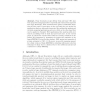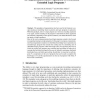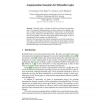811 search results - page 47 / 163 » Semantic Web Reasoning with Conceptual Logic Programs |
OWLED
2007
13 years 10 months ago
2007
Fuzzy Description Logics (Fuzzy DLs) and fuzzy OWL have been proposed as languages able to represent and reason about imprecise and vague knowledge. Such extensions have gained con...
ASP
2003
Springer
14 years 2 months ago
2003
Springer
Abstract. Often graphs are used to investigate properties of logic programs. In general, different graphs represent different kinds of information of the corresponding programs. ...
CLIMA
2006
13 years 10 months ago
2006
Abstract. The paradigm of argumentation has been used in the literature to assign meaning to knowledge bases in general, and logic programs in particular. With this paradigm, rules...
PRICAI
2000
Springer
14 years 18 days ago
2000
Springer
Defeasible logic is a simple but efficient rule-based non-monotonic logic. It has powerful implementations and shows promise to be applied in the areas of legal reasoning and the m...
CORR
2008
Springer
13 years 9 months ago
2008
Springer
Multi-relational networks are used extensively to structure knowledge. Perhaps the most popular instance, due to the widespread adoption of the Semantic Web, is the Resource Descr...



